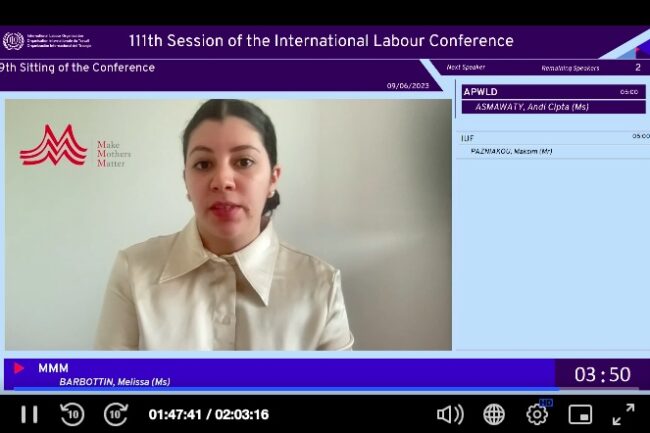MMM calls for recognition and support of mothers as part of Social Justice
09.06.23
UN Geneva - At the recent plenary meeting of the International Labour Conference, we reasserted the imperative, as part of social justice, of supporting caregivers, in particular mothers, in the world of work. In our message, we provided concrete measures to do so, and to redress the motherhood penalty.

The following is the full text of our statement ‘Recognizing and Valuing Unpaid Care Work: Promoting Social Justice for Mothers’
We welcome the discussion on Social Justice and congratulate the ILO Director General for his report. It is regretful however, that the concept of unpaid care work is so rarely mentioned, as well as the blatant omission of the word ‘mother’ in this otherwise excellent report.
At MMM, we believe that recognizing and valuing the unpaid care work performed by mothers is of paramount importance not just in itself but also, in helping to achieve social justice for all. Our aim is to shed light on the critical contributions made by mothers through their relentless dedication to caring for their families and communities without financial compensation.
Unpaid care work, predominantly performed by women, remains an under-appreciated cornerstone of our societies. Mothers, in particular, undertake an immense responsibility of care work including childcare, household chores, and emotional support, which often goes unrecognized and undervalued in economic and social spheres. This systemic devaluation and the inequitable distribution of this essential yet unpaid work, restricts women’s full participation in the labour market. It is also a cause of economic injustice and hardship for women, perpetuating gender inequality and impeding progress towards achieving social justice.
Therefore, we propose the following measures to redress this injustice:
- Recognition and Visibility: Governments and other stakeholders must acknowledge and affirm the invaluable contributions of mothers in society. By raising awareness and highlighting the significance of unpaid family care work, we can challenge societal norms, get men more involved and combat the stigma associated with this work.
- Economic Empowerment: Policy frameworks should be developed to ensure the economic empowerment of mothers. This includes promoting flexible working arrangements, offering paid parental and other care leave to both men and women, establishing fair wages for care-related professions, and providing adequate financial and social support for caregivers, such as tax benefits or social security schemes.
- Redistribution of Care Responsibilities: To achieve social justice, it is essential to redistribute care responsibilities more equitably amongst all members of society. Redistribution between men and women is key. Governments should also invest in high-quality, accessible, and affordable childcare services, eldercare support, and other social infrastructure to help/asisst mothers and other caregivers, and encourage a more balanced distribution of care work.
- Education and Skills Development: Encouraging the education and skills development of mothers is vital for their personal growth, the wellbeing of their family and their economic empowerment. Governments and employers should invest in programs that enhance their knowledge, promote lifelong learning, and provide opportunities for career advancement. The skills that mothers develop through the work of caring for their children and managing a home are also valuable skills that must be recognized by the labour market – in particular when they come back from maternity leave.
- Partnerships and Collaboration: Achieving social justice for mothers requires collaboration between governments, civil society organizations, employers, and communities. By forging partnerships, sharing best practices, and engaging in dialogue, we can foster a supportive environment that values and respects the unpaid care work performed by mothers.
- ‘There is no such thing as a woman who does not work; there is only a woman who is not paid for a work’ writes Caroline Criado Perez in her 2019 book Invisible women. Unpaid care work IS work, a fact which was recognized by a 2013 resolution of the International Conference of Labour Statisticians. Every unpaid caregiver, in particular mothers, should therefore benefit from inclusive social protection and security.
- Last but not least, mothers face specific discriminations linked to maternity. These include recruitment and access to employment, promotion and access to decision making positions, and a motherhood wage gap which is even wider than the gender pay gap. Acknowledging and addressing this ‘motherhood penalty’ in the world of work, is also part of the policy package to recognize and support unpaid family care work.
By embracing these measures, we can create a more just and inclusive society that recognizes and values the tireless contributions of mothers. We need to work together to transform societal norms, eliminate gender disparities, in particular in accessing decent work, and build a future where unpaid care work is valued, equitably shared, and fairly compensated.
Melissa Barbottin, our UN Geneva team member, delivered this statement via video as part of the general discussion on Social Justice at the 111th International Labour Conference, the annual gathering of the International Labour Organisation (ILO).
Breaking the Cycle: Gender Equality as a Path to Better Mental Health
18.03.25
The Council of the European Union has taken a decisive step in recognising the vital connection between gender equality and mental health.
Europe Must Listen to Mothers: Our landmark report heads to the European Parliament
28.08.25
On 22 September 2025, the voices of mothers will take centre stage in Brussels. For the first time, Make Mothers Matter (MMM) will present its State of Motherhood in Europe
Belgian Mothers Face Alarming Rates of Burnout and Perinatal Depression, New EU Survey Finds
03.07.25
Belgian mothers are facing a mental health crisis. According to the State of Motherhood in Europe 2024 survey by Make Mothers Matter (MMM) and Kantar, Belgium reports the highest rates








